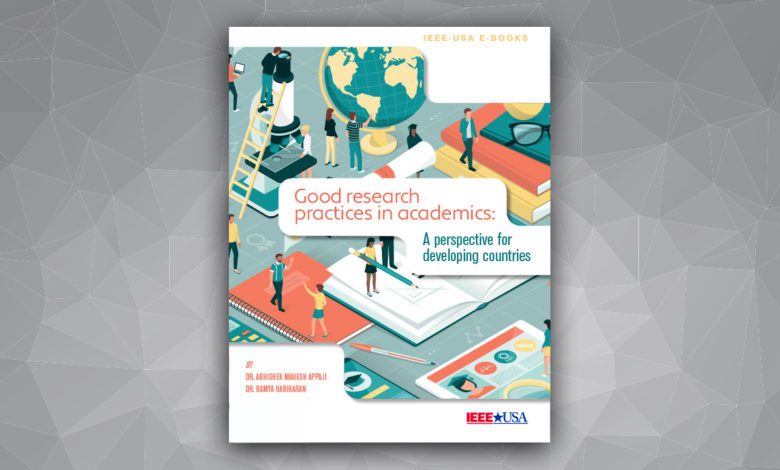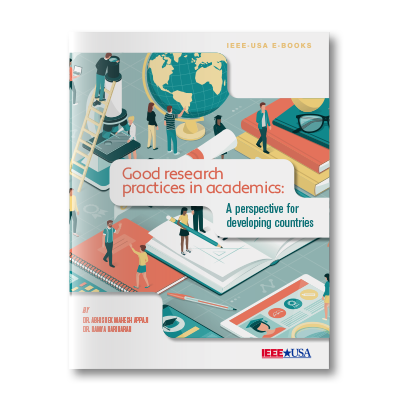

Engineering Activities for the Classroom – Volume 3: Engineering
FREE to Members
Non-Members: $2.99
Dr. Abhishek Mahesh Appaji and Dr. Ramya Hariharan offer strong, practical advice for fostering and supporting researchers in developing countries, in a new informative IEEE-USA e-book, Good Research Practices in Academics: A Perspective for Developing Countries. While drawing on their varied and extensive research experience in India, the book offers many tips, checklists and guidance that can be valuable to researchers anywhere.
The authors point out that more than $1.7 trillion is spent on research every year, though only a small fraction is spent in developing countries. They argue that with limited funding, it is critical universities provide the needed support for all levels of researchers, and they outline how this support might best be given.
Drs. Appaji and Hariharan maintain that while “investment in research takes a backseat in developing countries, mainly due to financial constraints,” basic research is, in fact, critical for countries being prepared for crises — like the current pandemic. Further, they assert: “Quality research is a necessity to prepare for the surprises hidden in the future.”
The authors outline the four main types of academic researchers (potential research scholars, research scholars, young researchers and experienced/independent scholars) and stress how important it is to instill in researchers at every level: a curious mind, a desire for perfection, a clear research strategy, and strong research ethics and integrity.
The book discusses how academic institutions can play a role in overcoming the four obstacle researchers face in developing countries, which they describe as:
- Lack of a well-defined research methodology – Universities need to set up clear, precise and transparent research procedures.
- Scarcity of research grants – Research universities can bring awareness of grants and other resources to their researchers, and support them in pursuing them.
- Difficulty in accessing experimental resources – There are multiple challenges to obtaining resources/funding — including excessive procedures; expense and time lags for obtaining raw materials of research quality; and difficulties in obtaining sophisticated equipment. Research universities should assist researchers in overcoming these issues, according to the authors.
- Limited access to publications – A majority of international scientific journal publications or conference proceedings are subscription based, requiring that authors buy articles, a challenge for researchers from developing countries with tight budgets. The autors say universities need to assist them in getting access to needed resources.
Drs. Appaji and Hariharan suggest that a strong resource and development department within a university can help guide and mentor researchers, foster collaboration, hold research workshop, streamline the process for patent filing, and give assistance in turning research into intellectual property and potential businesses. They conclude that the role of the development department is critical to the success of research — and that the department “should function to reduce the hurdles that adversely affect the quality of research in the university.”
Understanding that financial resources are key, the authors devote an entire section to obtaining funding. They talk about the importance of being aware of timelines — making sure the proposal is completed well ahead of time; allowing the researchers to bring on appropriate collaborators; ensuring that experienced researchers review and critique the proposal; and giving ample time to ensure the proposal is error free — containing no spelling or grammar errors.
The authors also provide other advice to make sure that a proposal has the best chance of being funded, providing realistic budgets and offering tips for researching the funder and their past projects. Finally, they suggest to not get discouraged if a funding proposal is not accepted — but to instead, “invest considerable time and effort in making revisions and resubmit to the same, or a different funding agency.”
Of course, after completing research it is important to share that research with others. The authors provide tips for getting papers published, including: researching the publications fully in advance (determining if articles are peer-reviewed, how often articles are cited elsewhere, etc.); knowing the restrictions on submissions (page length, format of tables etc.); understanding the publication timeline (including length from submission to publication); and identifying any fees or costs associated with submissions. They also lay out common mistakes to avoid.
Drs. Appaji and Hariharan are strong advocates of collaboration, believing “collaboration is the key to overcoming the challenges introduced by limited resources.” Some of the value of collaboration they discuss are:
- Improving the quality of research
- Drawing on the expertise of others
- Pooling of research facilities
- Laying the groundwork for industrial collaboration
- Gaining novel perspectives to complex problems
- Adding funding and publication opportunities
Good Research Practices in Academics: A Perspective for Developing Countries is available for free to all IEEE members via the IEEE-USA Shop. The book is also available to non-members for $2.99.
This e-book will prove especially valuable for both the beginning researcher — or the more experienced researcher who is looking to mentor others.
Paul Lief Rosengren is the coauthor of In the Time of Covid: One Hospital’s Struggles and Triumphs. He worked for more than three decades in communications at NBC, PSE&G and in state government. He has a Masters in Public Policy from The Kennedy School of Government, Harvard and an undergraduate degree in political science from Dickinson College.



